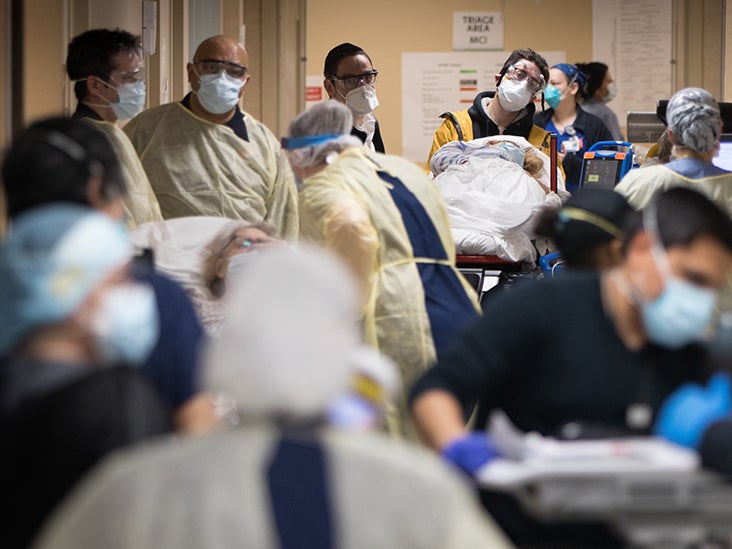
- The World Health Organization (WHO) recently updated a living guideline on COVID-19 drugs. In it, they conditionally recommend the use of monoclonal antibodies to treat patients with non-severe disease at highest risk for hospitalization and patients with severe or critical illness who have not mounted an antibody response.
- The guideline is based on a meta-analysis of several studies and trials. In one of these trials, monoclonal antibody treatment with casirivimab and imdevimab reduced hospitalization risk by 71{fe463f59fb70c5c01486843be1d66c13e664ed3ae921464fa884afebcc0ffe6c}.
- In another trial, treatment with monoclonal antibodies decreased the risk of death in patients with severe or critical COVID-19 who did not generate SARS-CoV-2 antibodies by 15{fe463f59fb70c5c01486843be1d66c13e664ed3ae921464fa884afebcc0ffe6c}.
- Areas that need further research include accurate clinical guides to predict hospitalization risk in patients with non-severe COVID-19, determining optimal dosage and administration routes in non-severe and severe or critical COVID-19, and establishing safety and efficacy in children and during pregnancy.
The WHO recently updated a living guideline that provides recommendations for new COVID-19 drug treatments to include monoclonal antibodies (casirivimab and imdevimab).
Casirivimab and imdevimab are two laboratory-made proteins, similar to human antibodies, that target the spike protein of the SARS-CoV-2 virus, blocking its attachment and entry into the human cell.
The recommendations were published based on a systematic review of meta-analyses and large and international clinical trials. A meta-analysis in patients with non-severe disease showed monoclonal antibody treatment with casirivimab and imdevimab reduced hospitalization risk by 71{fe463f59fb70c5c01486843be1d66c13e664ed3ae921464fa884afebcc0ffe6c}.
Stay informed with live updates on the current COVID-19 outbreak and visit our coronavirus hub for more advice on prevention and treatment.
In the RECOVERY trial quoted by the WHO, treatment with monoclonal antibodies decreased the risk of death in seronegative patients with severe or critical COVID-19 by 15{fe463f59fb70c5c01486843be1d66c13e664ed3ae921464fa884afebcc0ffe6c}. Seronegative describes people whose blood serum tests revealed no antibodies for SARS-CoV-2.
In an interview with Medical News Today (MNT), Dr. William Schaffner, professor of infectious diseases at Vanderbilt University Medical Center, TN, explained: “Once people are infected, […] these antibodies can be given […] by intravenous infusion, and they will latch onto the virus, preventing it, thereby, from infecting more of our cells. If the virus cannot do that, it cannot evolve into creating more serious disease; in other words, the good guys cut the bad guys off at the pass.”
The WHO conditionally recommends treatment with casirivimab and imdevimab for those with non-severe COVID-19 at the highest risk for hospitalization. Their guideline appears in
In an MNT interview, according to the WHO, “This is the first drug that [the] WHO is recommending as a treatment for non-severe patients to reduce the risk of disease progression for those with the highest risks.”
A meta-analysis using data from 4,722 patients with non-severe COVID-19 in 4 randomized controlled trials showed that treatment with casirivimab and imdevimab reduced hospitalization risk by 71{fe463f59fb70c5c01486843be1d66c13e664ed3ae921464fa884afebcc0ffe6c}, resulting in 29 fewer hospitalizations per 1,000 patients. Monoclonal antibody treatment also reduced the duration of hospitalization by approximately 4 days.
The WHO also conditionally recommends using casirivimab and imdevimab to treat people with critical and severe COVID-19 who are seronegative.
The presence of
Additionally, the WHO defines severe COVID-19 as the presence of one of the following:
- when the amount of oxygen in the blood, or oxygen saturation, is less than 90{fe463f59fb70c5c01486843be1d66c13e664ed3ae921464fa884afebcc0ffe6c}
- symptoms of severe respiratory distress
- inability to complete entire sentences
- use of accessory muscle use
- in children
- grunting
chest wall indrawing , very extreme inward movement of lower chest on inspiration- central cyanosis, bluish discoloration of the skin, mucous membranes, lips, tongue, and nail beds
Results of a
In this group, monoclonal antibody treatment reduced the need for mechanical ventilation by 13{fe463f59fb70c5c01486843be1d66c13e664ed3ae921464fa884afebcc0ffe6c}.
Dr. Schaeffer explained that even though monoclonal antibody treatment is effective, there are many advantages to preemptive vaccination versus monoclonal antibody treatment.
“First of all, the vaccines are safe and effective, and they’re […] much cheaper. For example, vaccines cost U.S. taxpayers […] about $25, but monoclonal antibody treatment will cost over $2,000.”
He added, “Also, you don’t always get diagnosed early enough in order to take advantage of monoclonal therapy, and [it] is not given to everyone — you have to fit into a specific high-risk category in order to receive it. Lastly, […] monoclonal antibody is in relatively short supply — it’s now being rationed […] in the United States — and it may not even be available for everyone who needs it.”
The WHO Guideline Development Group panel acknowledges that obstacles to accessing the monoclonal antibody treatment may be particularly burdensome in some low-to-middle-income countries. The cost of the drug, special equipment needed for intravenous administration, rapid serological tests required for severely and critically ill patients, and special monitoring for allergic reactions, may pose challenges.
According to the WHO, “Some opportunities for further research into casirivimab and imdevimab include making sure there will be accurate clinical prediction guides to establish [the] individual patient risk of hospitalization in patients presenting with non-severe COVID-19 […] to best identify patients that would most benefit from this intervention, [determining best] dosage and administration routes in non-severe and severe/critical COVID-19 patients, and [establishing ]safety and efficacy in children and pregnant women.”
“Future research also includes the production of higher certainty and more relevant evidence to inform policy and practice, along with the emerging evidence in the rapidly changing landscape of trials for COVID-19.”
For live updates on the latest developments regarding the novel coronavirus and COVID-19, click here.
